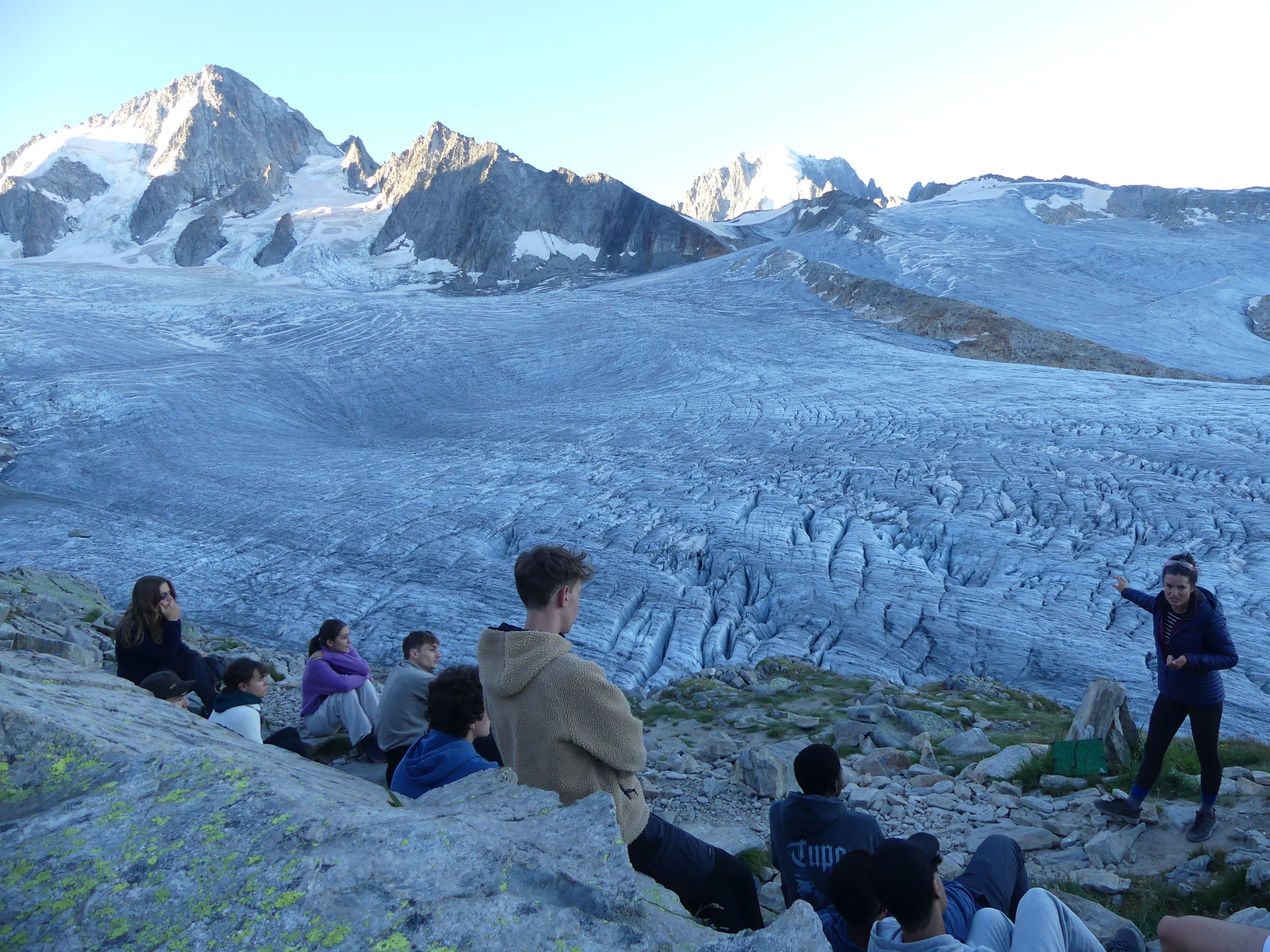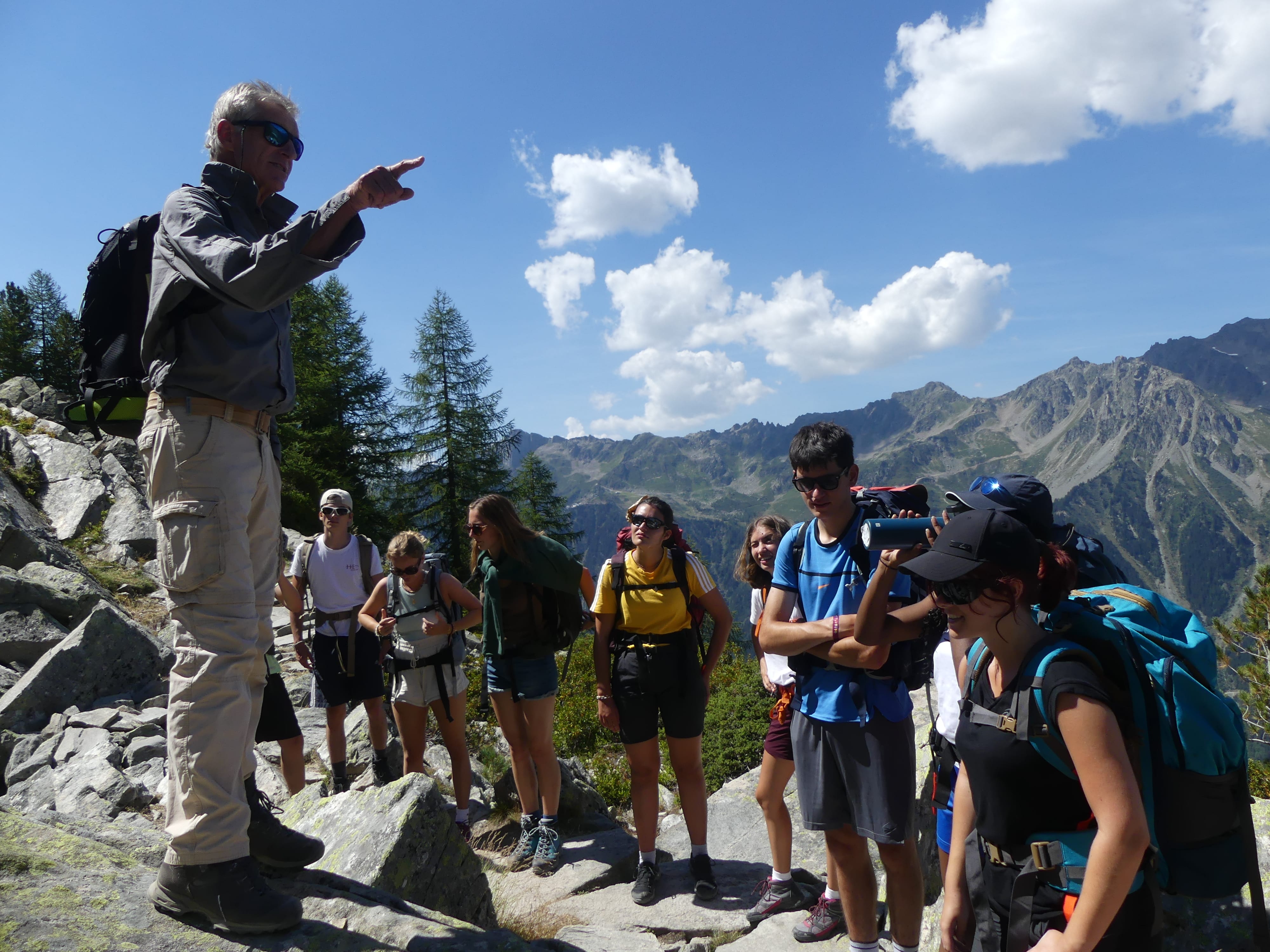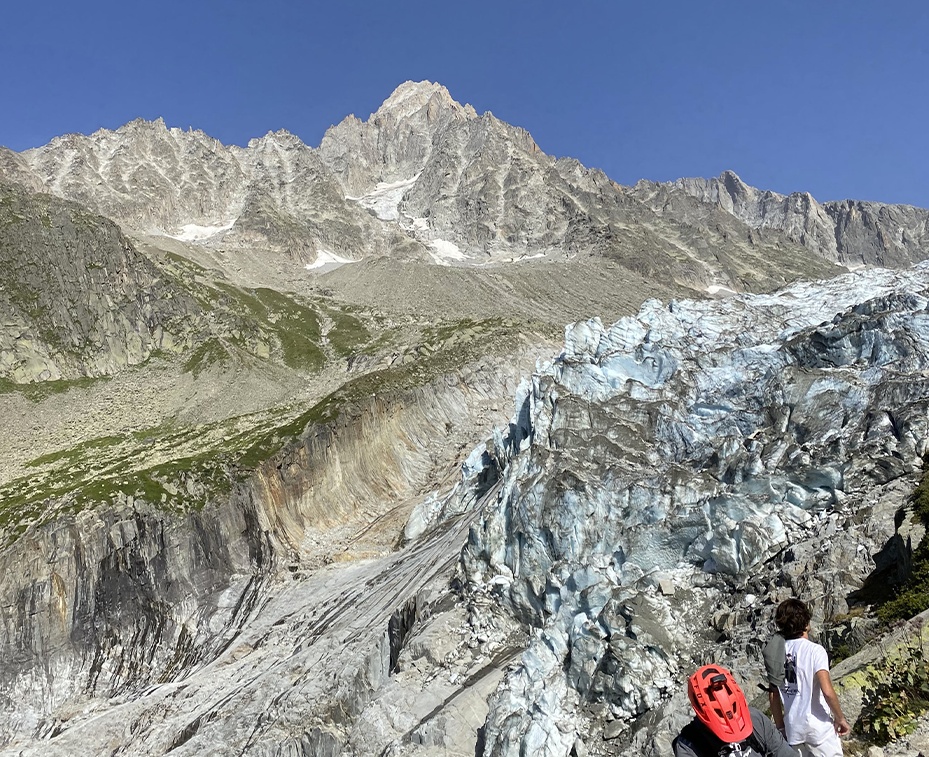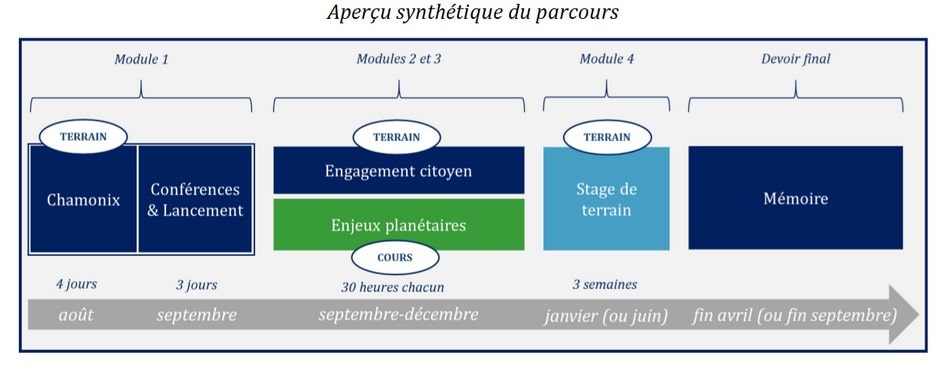Do you have to see a glacier melt to rethink the world?
Barely had they arrived in their first year, the L3 students from HEC Paris took part in a compulsory seminar in Chamonix from August 21 to 24, focusing on the quest for meaning and raising awareness of global warming. Faced with a sea of deeply dried-up ice, these young people, fresh from their preparatory class, were launched on an innovative quest for purpose that should lead them to reflect on the spot and well beyond these 4 days on the finality of the business world, on the conditions for a more human economy caring for environment, and guide them in their individual path of commitment.
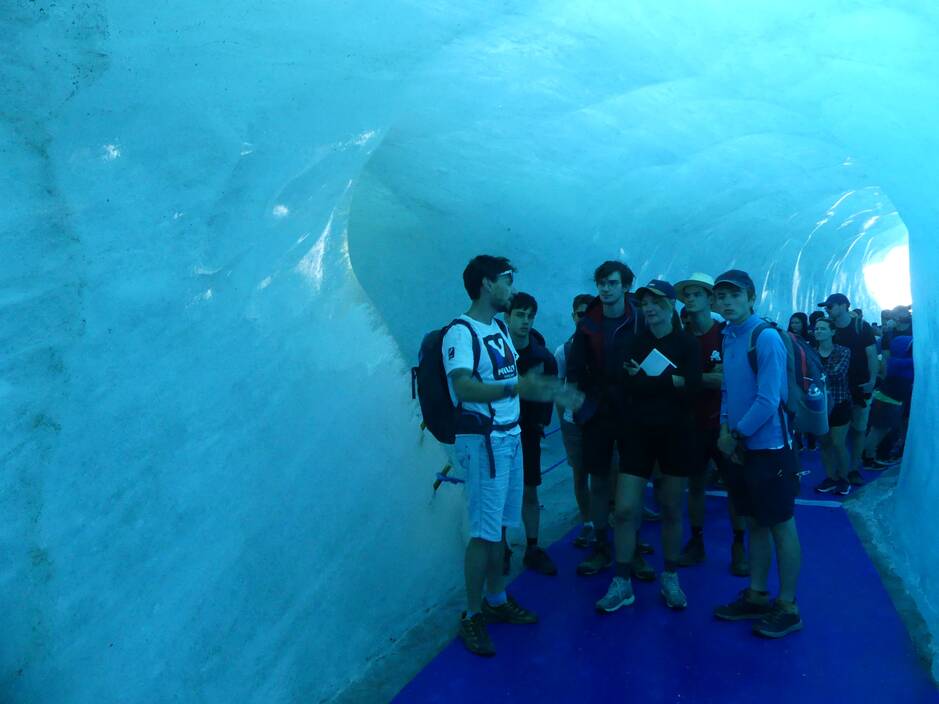
HEC Paris young students discovering an icecave in Mont-Blanc (© Julie Dobiecki)
Auteur/Author of this article: Frédéric Voirin
"Before Monday 12:11pm, the start of our stay in Chamonix, I was convinced we were going to be greenwashed by HEC". Paul Barrault, 20 years old and a freshly admitted first-year student at Europe's leading business school, immediately dispels any doubts about the positive impact this awareness-raising trip to the Alps has had on his eco-awareness.
Barely out of prep school and already on a collective and environmental quest for meaning
"Students are coming out of difficult, studious years of preparatory classes, and we wanted this to be both a breath of fresh air and a way of opening up their horizons". With these words, Julie Thinès, Executive Director of Academic Programs and Schooling at HEC Paris, succinctly sums up what for some can become the adventure of a lifetime. Following in the footsteps of their eco-furious fellow students from HEC Transition, who in December 2022 were campaigning for a rapid start to the ecological transition by producing less but better, the newly admitted L3 students at HEC Paris had to reflect on their own condition as young business school learners, on their current and projective lifestyles, but also on the purpose of their future professions and the societal and environmental challenges they could engender.
Thanks to this back-to-school seminar launched in 2019 by HEC Paris' Society and Organizations institute and centralized in Chamonix for all L3 classes in 2021, and in line with the school's new curriculum focused on ecological and social transition the younger generations of HEC students are learning to better understand themselves and the world in exceptional situations, but also to preserve the environment around them.
"This seminar is a breath of fresh air for students fresh out of the preparatory program"
As their very first experience as students at HEC Paris, these young people are immersed, far from the flat land of Saclay on the steep trails of Mont-Blanc, in a series of activities testing their individual resilience but above all their ability to overcome challenges as a team. The program, devised by Blaise Agresti, a former member of the Gendarmerie's high-mountain platoon and co-founder of the Mountain Path consultancy, includes a 6-kilometer hike with 800 meters of ascent, orienteering, rock climbing, an excursion by roped party of 15 up to the glacier, and a night in a refuge without shower or drinking water.
These students, who have not yet set foot on the Jouy-en-Josas campus, experience not only the fragility of the mountains, but also their own doubts and extreme situations, such as simulated mountain rescue exercises. Newly admitted HEC students rub shoulders with committed professionals with a positive impact, such as alpine guides, first-aiders and doctors, who encourage them to question the meaning of their personal and collective mission.
What kind of citizen, colleague or leader do they want to be? What kind of society and economy do they want to contribute to tomorrow? What makes individual and collective action meaningful and successful? What alternative lifestyles and consumption patterns should we adopt for a sustainable world?
This unforgettable seminar for these 20-year-olds is the starting point for a personal reflection designed to help them find their way, and think about social and ecological issues, the positive purpose of work, leadership and enterprise, and alternative models for building a more humane and environmentally-friendly economy.
A leadership and ecological awareness seminar in the face of a collapsing glacier
These experiences and encounters help HEC Paris L3 students to become aware of their personal limits and challenges, but also to surpass themselves and take up our collective societal challenges.
Yasser Mouaqqat, a young L3 student, explains that this seminar "enabled to understand how our personal actions influence society and the environment, particularly in the mountains". Before arriving at HEC, this young man wondered how his experience on campus would give meaning to his personal and professional career. "I wanted to get as involved as possible in the courses and workshops offered by HEC, and in community life in order to find that meaning. Now I realize that irresponsible action can have a negative impact on the environment, for example by melting glaciers, and that getting involved in first aid can save hundreds of lives."
Taking the form of an itinerary through the valley, this initiatory mountain journey takes the group to the glacier of the Mont Blanc, but above all to meet experts such as glaciologist Laura Gattini and geomorphologist Ludovic Ravanel. They explain that the glacier usually melts by 4.3 metres every year, except in 2022, which saw a deplorable record of 16-meter-decrease.
Even at an altitude of 2,000 metres, the students feel the scorching heat of the heatwave, see the rock outcropping above the ice with their own eyes, and become aware of the major environmental challenges as they come to grips with the consequences of global warming.
Marie Mallet, a former student at "Ginette" (a preparatory school in Versailles run by the private Lycée Sainte-Geneviève), was initially very skeptical about the meaning of this compulsory seminar, but when confronted with the stunted glacier, she lucidly reviewed her feelings: "finding yourself in front of three rocks and in an icecave where you're not even cold, it's terrible".
As the glaciologist explained the catastrophic effect of global warming on the mountain environment, the students witnessed the collapse of the north face of the Aiguille du Midi. "An experience that is definitely more impressive than the figures", quips glaciologist Ludovic Ravanel. And indeed, for Yasser Mouaqqat this landslide is "the most memorable moment of the trip, as it showed us first-hand the seriousness of the situation, and this kind of event is becoming more and more frequent."
"Finding yourself in front of three rocks and in an icecave where you're not even cold, it's terrible".
A back-to-school seminar that goes on for a long time on Campus
A perilous climb on steep paths, short nights in mountain huts and hot sweats, this year's seminar was clearly no picnic. And to top it all off, the students still had to put in a great deal of academic effort once back on campus...and that until the end of the following year!
Back on the Jouy-en-Josas campus, the students spend three days taking stock of their experience in Chamonix and reflecting on the questions it raised for the general interest, as well as on their personal commitment. Yasser Mouaqqat, a young L3 student, explains that he was "already interested in contemporary social and environmental issues before coming to HEC, but the engagement course has made [him] even more aware of them", giving him the leverage to get involved during his studies (associative involvement, field placement, etc.).
These initial student reflections are then effectively enriched by back-to-school conferences - which can be viewed by clicking on this page - hosted by experts in the transformation of our lifestyles, such as Emma Haziza, hydrologist and climate change specialist, Rob Hopkins, initiator of the cities in transition movement, and François Gemenne, expert in climate governance and environmental migration, lead author of the IPCC and new Academic Director of the Sustainability and Social Innovation Master's program at HEC Paris.
Building on this foundation, L3 students then embark on a research project with the help of a dissertation director, exploring issues such as ambition, managing crises and uncertainty, the search for meaning and radicalism, vulnerability and the authenticity of the leader.
To complete their commitment program at HEC Paris, students will complete a 30-hour community involvement program with a public-interest organization, take a foundational course on "acting on global issues", and complete a 3-week internship in a company or association, with no required qualifications or managerial responsibilities.
To round off their commitment, they will write a comprehensive final dissertation, drawing on their experiences, written reports and encounters over the course of the year, inviting introspection and reflection on the mission of organizations. In this way, Yasser Mouaqqat hopes to "work towards social and environmental transition".
Romain Briat, enlightened leadership expert, Executive Director of the HEC Paris Purpose Center and head of the Engagement program, sums up the fundamental aim of these quasi-existential questions: "Where students find their joy, they will find a greater capacity to act, and generate a greater impact for the people around them and for the world".
"Where students find their joy, they will find a greater capacity to act, and generate a greater impact for the people around them and for the world".
In line with the reform of its curriculum focused on ecological and social transition, and without necessarily seeing a glacier melt in order to rethink our lifestyles, but well aware of its responsibility towards the challenges of today's world and anxious to contribute to a more sustainable economy that respects living beings, HEC Paris is extending its eco-responsible educational path. With a first year focused on social sciences (L3 engagement course) and a second cycle (Master M1 and M2) focused on the development of solutions through an entrepreneurial course, HEC Paris is reinventing itself under the banner of ecological transition and fully anchoring its actions in the school's raison d'être.
In this way, the school continues to have an impact on business and society through research, teaching and entrepreneurship, and hopes to contribute to a more inclusive, sustainable and prosperous world.
